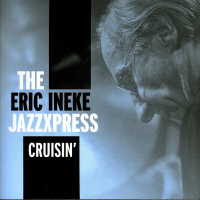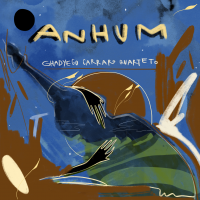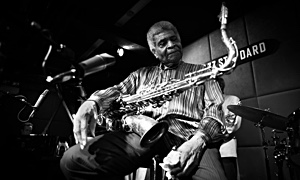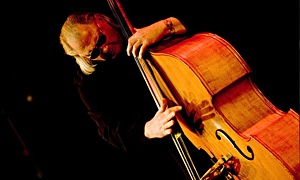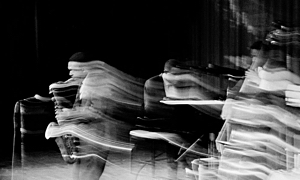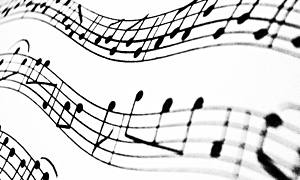Home » Jazz Articles » On and Off the Grid » Free Jazz Versus Free Improvisation
Free Jazz Versus Free Improvisation
Let's take a look at what makes up music. I was taught from the very beginning that music is composed of three parts: 1. Melody; 2. Harmony; 3. Rhythm.
Now add improvisation to the mix, and call it melody, and we have what is known as jazz. The main components of jazz are the improvisations and the rhythms. Without improvised solos it can't be called jazz. From the earliest days of blues to ragtime to swing to bebop to modern jazz, there was always time, chord changes and various rhythms. So what is free jazz? Some purport that free jazz should not have rhythm, a recognizable melody, whether tonal or atonal, and absolutely no harmony. Well is it jazz? I don't think so.
I have been playing free-form jazz for a long time, and when I hear players who call themselves avant-garde jazz players, I sometimes have to laugh. Music is music and free jazz should sound like music; not 2-15 musicians playing anything they want without relating to one another. Jazz players have a distinct way of phrasing. Just listen to John Coltrane or Albert Ayler. Whether they are playing free or free on chord changes, they swing. Although free jazz it is not your typical two and four swing, it has its own tempo. And guess what happens when free jazz musicians relate to one another? It becomes harmonic, fugal, contrapuntal, polytonic, and bluesy; and inside all of that, there is a beauty that can't be denied and it all makes sense—and it is listenable.
Every free-jazz musician I have ever worked with has studied. They understand harmony and theory, they can read and compose and they can play in time and on chord changes. Ask any one of them about the history of jazz and they can speak at length about their experiences and who their main influences were. And they all grew up listening to Charlie Parker and all the greats just as I have. What may be missing with the young free players is they start with late John Coltrane instead of studying the past, and their music reflects the missing history in their playing. You can't move forward without reflection of the past.
Free-form jazz musicians choose to play that way as I have. It was a natural progression for me. Do I strictly play free? No! I enjoy playing on tunes and changes. I especially enjoy playing on tunes and taking the tunes out while playing in time. Does that make me a free-form jazz musician-no, but I do play free-form jazz i.e., without form, melody, harmony and rhythm, but when I play free with other musicians, inevitability we play and combine all those ingredients that music allows and it sounds like music, not a mishmash of nothing relatable. Cellist, Tomas Ulrich says "the main difference between free jazz and free improvisation is that free jazz is blues oriented," and I agree with him.
Is free jazz or free improvisation really free? Connie Crothers thinks it isn't. She says it's a style of playing and I think she is right. When I compose for one of my groups, invariably in the arrangement you may see Free Form or Collective Improv and what I mean is style.
More and more, you hear classically-trained musicians playing free-form improvisation. We are seeing symphonic musicians improvise. They don't have a jazz or harmony background, but they can improvise. Their training comes from years of playing classical music or solo pieces which were mostly started as improvisations by the composers.
Then we have the other component of improvisers, the noisemakers and the screeching, metallic, feedback distortion that is supposed to be avant-jazz. Ok, I'm a little prejudice and maybe old fashioned, but when I listen to Cecil Taylor, I hear music. When I hear noise, I hear bad rock and roll. FXs are sound devices that some musicians use, but sometimes those devices are used to hide bad musicianship. I believe in soundscapes, but do it with notes or the natural sound FXs from your instrument without pedals. Chaos is also fine as long as it is used with discretion. All I am saying is be musical. I mean you're called a musician for a reason, so be a musician.
Improvised music players come from varied backgrounds such as rock, blues, classical but again I say they should not be bunched together with jazz musicians. You may be a great instrumentalist, but if you can't play jazz or a blues, you're not a jazz musician.
I will not mention names, but when a journalist calls some musicians jazz musicians, they are dead wrong. There is no jazz in their playing and that's what's wrong with the Jazz Critic Polls at the end of the year. Many of the players are not jazz players. They need to be put in another category such as Improvised Music or The Improvisers Club.
Can Free-Form Jazz and Improvisation be tasteless? Oh yeah! That is why so many of the straight-ahead players of today dislike it and put down the musicians who play it. It took many years for the likes of Schoenberg and other 20th century composers to be accepted and although free form has been around for a long time now, it is still not accepted in the world of jazz. Some free jazz musicians have an elitist attitude and it reflects in their demeanor and the way they present themselves and the music, which makes it not about the music, but more about their egos and themselves.
As I stated earlier, taste or musicality is an essential part of any performance whether it is blues, bebop or free. There is also another component to mention. Free jazz emerged during the loft scene in New York City during the sixties. It was a time of turmoil. Civil rights, the Vietnam War, drugs all culminated into a very angry time and free jazz reflected that time and it is still thought of as angry music by many, but like all things it has evolved and changed. Listen to Joe McPhee and Trio X. There's no anger there, just beauty, and there are many free jazz players out there who reflect that beauty in their playing.
Because of its unacceptance here in the US, free-jazz players have a hard time making a living. In order to perform, they are playing for the door or on passing-the-hat type of gigs, which is demeaning. Record companies only put out completed masters recorded and paid for by the musicians, who have to buy back at least one hundred CDs. It is a win-win for the record companies and a lose-lose for the musicians, but that's another story. (See my two-part article: What's The Point)
Is free-form jazz different than free-form improvisation? I say it depends on who is playing it. Can free form musicians play with free jazz players? Most certainly yes, but the key ingredient is listening. If you don't listen and play off of one another, you are playing for yourselves, which is all ego-induced and does not make it musical.
I can't stress enough that musical creativity is the answer to acceptance of free music. John Coltrane was the first to make avant-garde jazz popular, if only for a short time, but he was able to do it because his playing had evolved to that point and you could hear it in his early recordings straight through to the end of his life, but throughout his career he was, above all, musical!
Tags
Dom Minasi
On and Off the Grid
All About Jazz Publicity
United States
John Coltrane
Albert Ayler
Charlie Parker
Tomas Ulrich
Connie Crothers
Joe McPhee
PREVIOUS / NEXT
Support All About Jazz
 All About Jazz has been a pillar of jazz since 1995, championing it as an art form and, more importantly, supporting the musicians who make it. Our enduring commitment has made "AAJ" one of the most culturally important websites of its kind, read by hundreds of thousands of fans, musicians and industry figures every month.
All About Jazz has been a pillar of jazz since 1995, championing it as an art form and, more importantly, supporting the musicians who make it. Our enduring commitment has made "AAJ" one of the most culturally important websites of its kind, read by hundreds of thousands of fans, musicians and industry figures every month.



